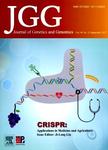Clinical significance of germline copy number variation in susceptibility of human diseases
Clinical significance of germline copy number variation in susceptibility of human diseases作者机构:Department of Cardiothoracic Surgery Jinling Hospital School of Clinical Medicine Nanjing University Institute of Laboratory Medicine Jinling Hospital School of Clinical Medicine Nanjing University
出 版 物:《Journal of Genetics and Genomics》 (遗传学报(英文版))
年 卷 期:2018年第45卷第1期
页 面:3-12页
核心收录:
学科分类:0710[理学-生物学] 07[理学] 071007[理学-遗传学]
基 金:supported by the Basic Research Program of Jiangsu Province (BK20160606)
主 题:Copy number variation Susceptibility Risk Cancer Neuropsychological disorders
摘 要:Germline copy number variation (CNV) is considered to be an important form of human genetic poly- morphisms. Previous studies have identified amounts of CNVs in human genome by advanced technologies, such as comparative genomic hybridization, single nucleotide genotyping, and high-throughput sequencing. CNV is speculated to be derived from multiple mechanisms, such as nonallelic homologous recombination (NAHR) and nonhomologous end-joining (NHEJ). CNVs cover a much larger genome scale than single nucleotide polymorphisms (SNPs), and may alter gene expression levels by means of gene dosage, gene fusion, gene disruption, and long-range regulation effects, thus affecting individual phenotypes and playing crucial roles in human pathogenesis. The number of studies linking CNVs with common complex diseases has increased dramatically in recent years. Here, we provide a comprehensive review of the current understanding ofgermline CNVs, and summarize the association of germline CNVs with the susceptibility to a wide variety of human diseases that were identified in recent years. We also propose potential issues that should be addressed in future studies.



